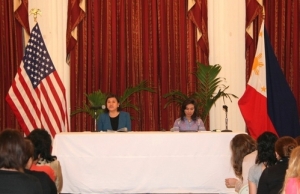Filipino Politicians Teach Students About Female Empowerment
August 12, 2013- Research
As part of a global immersion program this summer, students and leaders from the USC School of Social Work gathered in the capital of the Philippines to see firsthand how the country empowers its women through the legislative process.
Held at the U.S. embassy in Manila, the event brought together nearly 100 students, faculty members, alumni and community members to discuss the role of women in government, as well as critical issues facing women in the Philippines, including human trafficking, migrant labor, poverty, violence and health care.
Annalisa Enrile, a clinical associate professor at the USC School of Social Work, moderated the gathering, which featured keynote addresses by two women involved in politics in the Philippines, Senator Loren Legarda and former congresswoman Liza Maza.
Both speakers discussed their experiences in government and reflected on the role of women in the country in general. They dismissed the concept of “women’s issues,” instead arguing that all problems faced by a nation are applicable to women. For example, Legarda noted that as majority leader of the senate, she emphasized environmental issues and related negative consequences for women.
“It was very compelling to hear Senator Legarda’s belief that there is a strong but often unrecognized connection between women’s rights and the environment, specifically natural disasters,” said Jeanne Andrews, a USC Master of Social Work student who attended the event. “She pointed out that devastating hurricanes, earthquakes and typhoons currently and historically drive women to prostitute themselves for the first time as a means of providing food, shelter and safety for themselves and their families.”
Legarda also noted that women have lower survival rates during natural disasters, Andrews said, a disparity she associated with prioritization of medical treatment for men.
After delivering their keynote addresses, the two speakers answered questions from the audience, tackling topics ranging from the role of full-time housewives to reproductive rights to tourism. Students in the audience suggested expanding collaborative efforts between the Philippines government and other institutions around the world, including USC, a concept that so engrossed the legislators that they had to be interrupted as the event drew to a close.
“There it was, on that stage—women and empowerment using the legislative process,” said Charisma De Los Reyes, an alumna of the USC School of Social Work who also went on the trip.
Impressed with their enthusiasm, Legarda invited the students to the final session of the senate that afternoon as her guests, where they witnessed the senate president, Juan Ponce Enrile, resign his position.
“It was serendipity that our students could be here today to have this experience,” said Enrile, who is not related to the senator. “It will be on the front page of every newspaper, and our students will have been here in person. Their ability to see the political machinations, the real-life drama of the government, and the addressing of critical national and international issues and how that relates to their work as a social worker—that’s the purpose of this immersion.”
The USC School of Social Work offers a variety of cross-cultural immersion programs to MSW students to help them develop a stronger understanding of other cultures and how social services are delivered in international settings. The Philippines program, led by Enrile, focuses specifically on human trafficking for sexual exploitation and forced labor.
To reference the work of our faculty online, we ask that you directly quote their work where possible and attribute it to "FACULTY NAME, a professor in the USC Suzanne Dworak-Peck School of Social Work” (LINK: https://dworakpeck.usc.edu)
